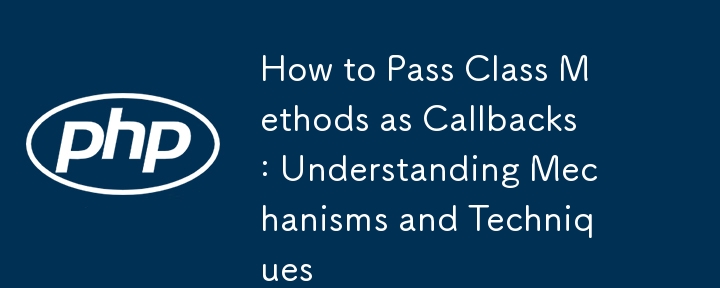Home >Backend Development >PHP Tutorial >How to Pass Class Methods as Callbacks: Understanding Mechanisms and Techniques
How to Pass Class Methods as Callbacks: Understanding Mechanisms and Techniques
- Susan SarandonOriginal
- 2024-10-19 21:47:021066browse

How to Pass Class Methods as Callbacks
Background
In some scenarios, you may need to pass class methods as callbacks to other functions for efficient execution of specific tasks. This article guides you through the various mechanisms for achieving this.
Using Callable Syntax
To pass a function as a callback, you can directly provide its name as a string. However, this method is not applicable to class methods.
Passing Instance Methods
Class instance methods can be passed as callbacks using an array with the object as the first element and the method name as the second. This approach works both within and outside the same class.
<code class="php">// Inside the same class $this->processSomething([$this, 'myCallback']); $this->processSomething([$this, 'myStaticCallback']); // Outside the same class $myObject->processSomething([new MyClass(), 'myCallback']); $myObject->processSomething([new MyClass(), 'myStaticCallback']);</code>
Passing Static Class Methods
Static class methods do not require an object instance. They can be passed directly as an array containing the class name and the method name.
<code class="php">// Inside the same class $this->processSomething([__CLASS__, 'myStaticCallback']); // Outside the same class $myObject->processSomething(['\Namespace\MyClass', 'myStaticCallback']); $myObject->processSomething(['\Namespace\MyClass::myStaticCallback']); // PHP 5.2.3+ $myObject->processSomething([MyClass::class, 'myStaticCallback']); // PHP 5.5.0+</code>
Additional Options
Apart from the mentioned methods, you can also pass anonymous functions as callbacks, but this may require modifications to your code structure.
The above is the detailed content of How to Pass Class Methods as Callbacks: Understanding Mechanisms and Techniques. For more information, please follow other related articles on the PHP Chinese website!

